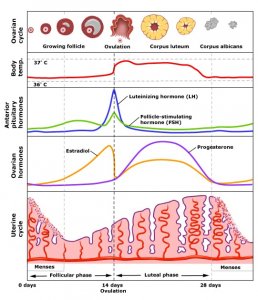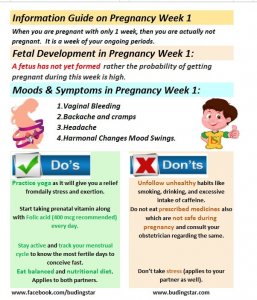A Complete Information Guide on Pregnancy Week 1
When you are pregnant with only 1 week, then you are actually not pregnant. Surprised? Yes, it is true.
During the 1st week (hoping to be pregnant soon) of pregnancy is a week of your ongoing periods. Track your menstrual cycle to know your Ovulation Period as the best possible time of getting pregnant fast is around ovulation. Ovulation is a time when a mature egg/ovum is released from an ovary, pushed down via Fallopian tube and is available to be fertilized. Ovulation occurs in mid-cycle.
Two days before ovulation and two days after ovulation is the best possible time for you to conceive. (It is considered best possible time because ovum/egg survives for 48 hours i.e. 2 days and sperms survive for 72 hours i.e. 3 days). This is the reason this period is called “the fertile window” period/days. Thus, by tracking your ovulation, you will get to know the days when you are most fertile. So, if you will have sex with your partner in that phase i.e. fertile window period/days and you get lucky enough (if your partner’s sperm meets ovum), the fertilization will happen and thus you will conceive.
| [icon type=”icon-lamp”] Don’t know when you ovulate and your fertile days? Use Budding Star’s Ovulation Calculator to know this by entering the first day of your last period & length of your cycle- Ovulation Calculator |
|---|
So, according to the experts and obstetricians, 1st week is not considered to be a pregnancy phase.
[icon type=”icon-lamp”] Trying to conceive? So, you may be interested in reading how to get Pregnant Fast naturally-Tips to get Pregnant fast |
|---|
Pregnancy starts from two to three weeks later, depending upon the length of your menstrual cycle. When you will come to know about your pregnancy, you would be probably around 4 weeks pregnant.
Fetal Development in Pregnancy Week 1:
Pregnancy week 1 is a week of your ongoing periods. A fetus has not yet formed rather the probability of getting pregnant during this week is high.
How much does your baby grow at 1st trimester weeks?
To your surprise, the baby is only a little glint in your eye. Keep in mind that you aren’t genuinely pregnant just yet; if you are, you’re probably four or five weeks along.
1-week Pregnancy Ultrasound
An ultrasound at week one of pregnancy is unlikely. However, if you’ve been trying to conceive for some time and have seen a fertility specialist, they might advise you to go for an ultrasound to look for fibroids, count the number of follicles in your ovaries (which develop into eggs), and/or measure the thickness of your uterine lining. Your doctor might recommend a fertility therapy to help you get pregnant if there are any issues. Prepare to have some sex right now. You need to start a family!

Moods & Symptoms in Pregnancy Week 1:
As this is an early stage of pregnancy, hence there would no specific change in your mood and there will be no symptom of pregnancy. The symptoms which you are experiencing here will a typical as of your normal period’s days. These symptoms include:
- Vaginal Bleeding
The uterine lining, which was expanded specifically in case of a pregnancy, is being lost by your body.
- Backache and cramps
Your uterus contracts to discharge that lining, giving your back and abdomen pain.
- Bloating
Hormone changes can cause you to feel bloated before and during your period.
- Headache
Menstrual migraines, which are likewise hormone-related, are a common complaint among women. However, the use of ice packs, over-the-counter painkillers, and relaxation techniques may reduce pain.
- Mood swings due to the change in hormones
Additionally, those hormonal fluctuations might make you feel irritated and affect you emotionally.
Do’s & Don’ts in Pregnancy Week 1:
To make an ovulation better, you should do some minor changes in your life style. The following table of Do’s and Don’ts i.e. important tips for Pregnancy week 1 will help you for better understanding:
| Do’s | Don’ts |
| Practice yoga or do exercise as a normal day routine as it will give you a relief from daily stress and exertion. | Unfollow unhealthy habits like smoking, drinking and excessive intake of caffeine. |
| Eat balanced and nutritional diet. | Do not take over the counter (OTC) medicines. |
| Please remember, a male partner has also got a major role as the healthy sperm plays a great role in getting pregnant. Therefore, it is very important to look after the health and the life style of a male partner too. | Don’t take stress (applies to your partner as well). |
| Start taking prenatal vitamin along with Folic acid (400 mcg recommended) every day. | |
| Stay active and track your menstrual cycle to know the most fertile days to conceive fast. |
For your reference- Pregnancy Week 1:

FAQS:
1. Can I have pregnancy symptoms at 1 week?
The early stages of pregnancy might vary from person to person and from pregnancy to pregnancy. You may experience physical changes before you even realise you are pregnant, or you may experience no symptoms at all. A missing period, increased urine, sensitive breasts, exhaustion, and morning sickness are some of early pregnancy symptoms.
Each person experiences pregnancy symptoms differently and at different periods. It's important to refrain from comparing your pregnancy to others' because pregnancy symptoms can differ so drastically from person to person.
You may or may not encounter a number of early pregnancy symptoms. The following are the most common symptoms:
Morning sickness:
This pregnancy symptom can happen day or night, despite its name. Nausea might appear as early as two weeks into a pregnancy. There are many levels of nausea, and not everybody gets it. You feel sick, yet you never throw up. Nausea and vomiting are common pregnancy side effects. Even though morning sickness is a common symptom of pregnancy, it can get worse if you start to feel dehydrated. Pregnant women who have hyperemesis gravidarum suffer from extreme nausea and have trouble swallowing food and liquids. Call your doctor if you are very dehydrated and experiencing severe motion sickness.
Frequent bathroom visits: Even before you miss a period, you could become aware of your urge to urinate more frequently. This is brought on by the fact that you have more blood than you had before. While pregnant, your body produces extra blood. Your kidneys filter the extra waste out of your blood. This waste is excreted by your body as uric acid. The more blood you have in your body, the more often you will urinate.
There are numerous additional early pregnancy symptoms that are less common. Like the most common symptoms, these pregnancy signs can happen or not. It's important to remember that every person experiences pregnancy symptoms differently.
Early pregnancy symptoms that are less typical include:
Early in a pregnancy, eating can be difficult because of cravings, constant hunger, and dietary aversions. Some people begin to want food or feel constantly hungry. Some flavours and foods may appear great in the early stages of pregnancy, while others may suddenly taste terrible. You could experience food aversions during pregnancy, making you dislike items you once loved.
Another possibility is to experience light, period-like cramps that come and go over a few days. If these cramps are unbearably painful or are mostly felt on one side of your body, you must consult your doctor immediately soon. This can be a sign of an ectopic pregnancy or something else.
Mood swings: As your hormone levels continue to change, you can experience mood swings. This is typical during pregnancy and can happen at any time. However, if you ever develop anxiety, sadness, or suicidal thoughts, it's imperative to get in touch with your doctor.
Any changes in your skin, including acne, are the result of your elevated hormone levels and blood volume. While some pregnant women glow and have clearer skin, others may get more pimples.
Dizziness and headaches: Headaches and vertigo are common throughout the first trimester of pregnancy. Your body's altering hormonal makeup and expanding blood volume both contribute to this phenomenon.
2. How does your stomach feel 1 week pregnant?
During your first week of pregnancy, you have your last period before giving birth. Since your estimated gestational age is calculated by counting backwards from the first day of your most recent period, technically, the first day of your pregnancy coincides with the first day of your menstrual cycle.
Throughout these days, your body will be getting rid of the egg and uterine lining from last month. The majority of women have heavier menstrual flows, especially in the first two days of pregnancy or your period. Your body will benefit from this as it prepares for a new cycle.
You won't truly have a baby bump during your first week of pregnancy or for the following few weeks. This week you will start your period, therefore it's possible that hormonal changes may make you feel a little bloated due to fluid retention. Some women say they experience cramps or stomach ache all throughout their period.
3. How soon do pregnancy symptoms start?
Because every woman's journey to childbirth is different, symptoms and times may vary. Some women may begin to feel their first pregnancy symptoms a week or two after conception, while others may begin to feel them closer to four or five weeks after conception. Some women may not have symptoms until much later in their pregnancies or even after their periods have become noticeably irregular. According to a study that was published in the Journal of Clinical Epidemiology, the majority of women (59%) reported the onset of pregnancy symptoms by their fifth or sixth week, 71% by the end of week six, and 89% by week eight.
- Period missed
You have probably been tracking your period and paying close attention each time you use the restroom to see if it has arrived this month if you are planning to become a parent. One of the first indicators of pregnancy is typically a missed period, which may portend the approaching birth of a child. Use a home pregnancy test to determine if you are pregnant. If the test is positive, get in touch with your OB/GYN to schedule your first prenatal checkup for around 8 weeks gestation.
- Sore breasts
Do you have tender, enlarged breasts? Having aching breasts is another indication that you may have given birth this cycle, but regrettably, some women experience soreness as a normal component of their monthly cycle, making it challenging to differentiate between the two. If you've just had a baby, the pain usually gets greater over time, and you might start seeing changes in the way your breasts look.
- Tiredness
Do your usual, daily duties make you feel exhausted? Unfortunately, you could feel worn out both during and after your pregnancy. Your body is producing extra blood to provide nourishment to your developing child. You should begin to feel a little more energised in the second trimester.
- Increased Smell Sense
Do the eggs you regularly make for breakfast make you suddenly feel nauseous? An intense sense of smell may occasionally accompany morning sickness, but this usually subsides during the first trimester.
- Bloating
Another uncomfortable early pregnancy symptom is gas. The symptoms of this condition, which include gas, bloating, burp, and stomach pain, are brought on by an increase in progesterone and oestrogen. This condition could persist throughout the entire nine months of pregnancy.
- Nurturing Your Child’s Growth – The Daycare Advantage - October 19, 2024
- Things to Do in the Big Apple: A Comprehensive Guide to New York City - September 30, 2024
- Building a Team: Creating Unforgettable Family Moments on a Budget - September 24, 2024
- Top 10 Tips for Good-Quality Sleep For A Relaxed Mind - September 18, 2024
- Unveil Face Massage Benefits For Brighter & Glowing Skin - April 9, 2024
- Menstrual Hygiene 101: Essential Tips for a Healthy Period - April 9, 2024
- Best Home Remedies for Pain During Periods - April 9, 2024
- 10 Postnatal Exercises That You Should Try After Pregnancy - April 9, 2024
- Prepare with Ease: Maternity Hospital Bag Checklist - April 9, 2024
- Understanding the Stages of Labour – What To Expect During Delivery? - April 9, 2024














